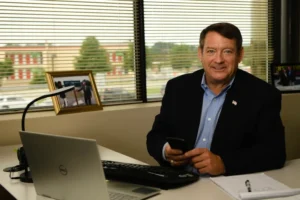The Republican ticket is now set, two months ahead of when we thought it would be.
On Monday, Fairfax County Supervisor Pat Herrity dropped out of the two-way race for lieutenant governor, citing health reasons — complications from heart surgery last month. That leaves Richmond talk show host John Reid as the party’s nominee on a ticket with Lt. Gov. Winsome Earle-Sears for governor and Attorney General Jason Miyares seeking reelection.
By contrast, Democrats have a ticket for former Rep. Abigail Spanberger for governor and, well, we’re not sure who yet for the other two slots.
Let’s look at what this early clarity on the Republican side could mean.
1. Herrity’s withdrawal is a big deal
“Politically speaking, this is an absolute earthquake,” said longtime Democratic strategist Ben Tribbett in a post on X.
“This is a huge, huge development,” concurred Chaz Nuttycombe, founder of the State Navigate political site.
Herrity was on the way to mounting a well-funded campaign. In the first-quarter campaign finance reports, he had raised more money than any of the candidates for lieutenant governor — on either side. He had raised $540,273, more than three times as much as Reid. By contrast, four of the six Democratic candidates for lieutenant governor had raised more than Reid — Levar Stoney, Aaron Rouse, Babur Lateef, Ghazala Hashmi, in that order.
Herrity’s exit deprives Republicans of a candidate who was going to be well-funded.
The money difference between the candidates is an even bigger deal when we look at cash on hand. Reid has just $90,990 in the bank. Five Democrats have more than that, starting with Rouse at $925,949.
As a Fairfax County officeholder, Herrity was also potentially helpful in Northern Virginia, a part of the state where Republicans have been weak in recent years. Gov. Glenn Youngkin was able to win the governorship four years ago partly because he was able to improve Republican margins in Northern Virginia. Maybe Earle-Sears and Miyares can do that on their own this year, but having a Fairfax County candidate on the ticket might have been something of an insurance policy.
2. Herrity didn’t have to drop out
Given his Northern Virginia base and his big treasury, Herrity could have stayed on and hoped for a faster health recovery as the year went on. One Republican posted on X, the social media platform formerly known as Twitter: “Takes a ton of integrity to set down a campaign you know you could win in favor of your family.” He’s right.
3. By leaving the race now, Herrity gives Republicans time to unify and raise money
Would Republicans have benefited from a primary? That’s hard to say. Sometimes primaries can energize a party, sometimes they can tear them apart. However, party leaders would always rather have their ticket set earlier rather than later. “Pat was a solid candidate; it was going to be a tough race between John Reid and Pat,” said state Sen. Mark Peake, R-Lynchburg, the new state Republican Party chair. Now Republicans can avoid that intramural contest. The early theme so far is that Democrats have more money than Republicans do; this gives Republicans time to make up that difference.
4. Democrats may yet savage themselves and burn through their money
Democrats have the luxury of knowing their gubernatorial nominee, but we don’t know yet how rough the six-way primary for lieutenant governor or the two-way primary for attorney general will be. “I think they’re going to tear each other apart and I look forward to watching it,” Peake said. We’ll see.
This much is clear: Reid doesn’t have to spend a cent he doesn’t want to right now. Those better-funded Democratic candidates will need to spend a lot of their money to win the nomination. Nobody wants to lose a primary and still have money in the bank they could have used.
Democrats will get a publicity advantage from their upcoming primaries; whether that turns out to be a practical advantage is unclear.
5. Both parties now have more time to define the Republican ticket
This can work both ways. Republicans get more time to say whatever it is they want to say about the shape of their ticket; Democrats get more time to call it extreme. To be sure, Democrats would have called the Republican ticket that anyway, no matter who the nominees were, so I’m not sure how important this particular point is. Still, clarity for one side is clarity for the other side as well. It all depends on how well each side uses that “extra” time. Peake, speaking shortly after Herrity’s withdrawal was announced, had already settled on one definition of the Republican ticket: “We have one of the most diverse tickets in the history of the commonwealth.”
That’s true: Earle-Sears has a chance to become the first Black woman elected governor of any state; Miyares is Virginia’s first Hispanic statewide officeholder. As for Reid:
6. Republicans have just nominated the first openly gay candidate for statewide office
That’s not an aspect of Reid’s background that he plays up. Still, this is history. It will be fascinating to see how that plays with more conservative elements of the Republican Party. Will that bother some voters more than the liberalism of whoever Democrats nominate? As with many things, we’ll see.
7. The most immediate impact of Herrity’s withdrawal will be on turnout in the June 17 primaries
Republicans will still be holding primaries in eight House of Delegates districts around the state, and in 12 counties for various local offices, usually board of supervisors nominations. A few of those House primaries overlap with local primaries (in Botetourt County, Craig County and Grayson County), but most don’t. With no statewide Republican primary to gin up turnout, that means the local races will now be the only driver of turnout. Who will that help or hurt? We have no idea; it just means that local primary candidates now can’t count on Republican voters showing up unless they work to make that happen.
It also means that most rural counties won’t have any primaries going on except for the statewide Democratic primaries. I recently wrote a column documenting how few people took advantage of early voting in many small communities in last year’s Republican primary. In Covington and Smyth County, the first voter didn’t show up until more than a month after early voting had started. And those are Republican localities. Turnout in a Democratic primary for down-ballot offices is likely to generate even lower turnout. Democrats may not like the numbers they see in some rural localities. In last year’s Democratic presidential primary (where, to be sure, Joe Biden faced two little-known challengers), not a single Democrat came out to vote in the Keokee precinct in Lee County.
That’s not unusual. In 2001, when the Democratic Party was stronger in Southwest Virginia than it is today, the winner of the four-way primary for attorney general (Don McEachin) didn’t win a single vote in Galax. With no statewide Republican primary on the ballot, a lot of registrars in some small communities are going to be sitting around waiting on voters who aren’t showing up.
Want more political news and analysis? Sign up for West of the Capital, our weekly political newsletter that goes out every Friday afternoon. You can sign up for that or any of our other newsletters here: https://cardinalnews.org/


















